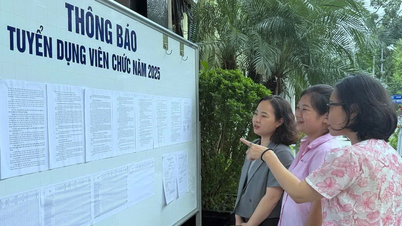According to Malaysia’s Myc website, the incident began on the morning of August 4, when the 29-year-old male researcher received a call from someone claiming to be an officer of the Shanghai Public Security Bureau (China). This person said that a package sent from Malaysia to China under his name had been intercepted, containing his ID card, credit card and checkbook - a sign that he could be involved in illegal activities.
Immediately after, the call was transferred to another person claiming to be an officer of the Hong An Public Security Bureau (China). This person accused his bank account of being involved in online fraud and threatened criminal prosecution if he did not cooperate.

30 transactions within 20 days
Fearful and believing he was assisting the investigation, the researcher transferred the money as requested. Between August 6 and 26, he made 30 transactions, transferring a total of more than RM847,000 to 11 bank accounts in Malaysia and three cryptocurrency wallets.
He only realized he had been scammed after telling his classmates. Advised to report the scam, he filed a report on August 28 at the Commercial Crime Police Station, Northeast District Headquarters, Penang (Malaysia).
Penang police chief Datuk Azizee Ismail confirmed that the case is being investigated under Section 420 of the Malaysian Penal Code for cheating. He stressed that many criminal rings often impersonate police, bank officials or civil servants to instill fear and force victims to comply.
“People need to be extremely vigilant with strange calls, especially those asking for personal information or money transfers,” he warned.
Why are international students easy victims?
According to experts, international students are the most vulnerable group to scams. Far from home, lacking knowledge of local regulations and often fearful of the words “police” or “authorities”, they easily fall into traps when subjects impersonate authorities or police from their home country.
The common point of these scams is that they strongly attack the psychology of fear. When they think they are involved in a crime, the victims often rush to do as asked to “solve the problem quickly”, only to realize they have been scammed.
Global problem
Malaysia has seen a number of phone and internet scams targeting both locals and foreigners. Particularly common are those who impersonate law enforcement agencies, falsely accuse victims of money laundering or drug trafficking, and then ask them to transfer money to a “safe account”.
These lines operate across borders, using both the traditional banking system and e-wallets and cryptocurrencies to launder money, making investigation and asset recovery difficult.
Malaysian police advise people to: Do not listen to strange calls claiming to be from the police or banks; Always verify information through official hotlines; Absolutely do not transfer money upon request over the phone; Consult relatives and friends before making major financial decisions.
Raising public awareness is considered the most effective “shield”, because most victims only realize they have been scammed after talking to others - like the case of the above researcher.
For this future PhD, nearly RM850,000 is an amount that is difficult to recover. This is not only a financial shock but also a mental one.
The incident is a warning: Even highly educated people can fall into traps if they are not vigilant. With increasingly sophisticated scams, everyone needs to stay alert, verify information and not rush to transfer money as requested by unexpected calls.
Source: https://vietnamnet.vn/du-hoc-sinh-tien-si-mat-hon-4-5-ty-vi-tro-lua-dao-qua-dien-thoai-2439132.html


![[Photo] Binh Trieu 1 Bridge has been completed, raised by 1.1m, and will open to traffic at the end of November.](https://vphoto.vietnam.vn/thumb/1200x675/vietnam/resource/IMAGE/2025/10/2/a6549e2a3b5848a1ba76a1ded6141fae)




































































































Comment (0)